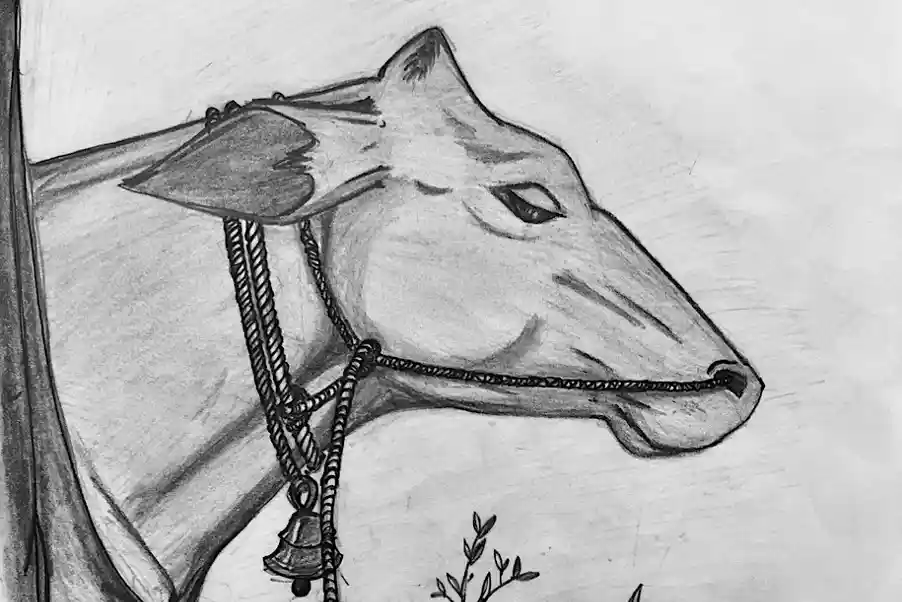
The Sad Reality of Livestocks, & The Middle Path
When we talk about food, culture, and survival, we cannot ignore the painful truth: animals across the world are being abused in the name of human consumption. Whether in developed or developing nations, the methods of slaughter and treatment reveal a deep disconnect between human progress and compassion.
Developed Nations: Industrial Cruelty Hidden Behind Technology
It is true that animals are often abused through mass slaughtering processes in developed nations. In Europe and the USA, chickens and pigs are often subjected to stunning electrification or suffocation through noxious gases.
- Chickens are crammed into gas chambers until they suffocate.
- Pigs, in particular, endure extreme pain — their screams during gassing are haunting, echoing the unbearable agony of sentient beings facing death.
This high-tech cruelty is hidden behind polished supermarket shelves, neatly packed meat, and marketing campaigns that make us forget the suffering behind every piece of flesh.
Developing Nations: Everyday Cruelty Normalized
If developed nations hide cruelty behind factory systems, developing nations expose it in plain sight.
In India, chickens are bought in bulk, stuffed into small cages, and often left under scorching heat. Many die during transport before even reaching the butcher’s table. Retailers transport them in the most inhumane ways — tied upside down on motorcycles, wings broken, legs twisted.
Across Southeast Asia, cruelty is often masked as cultural tradition:
- In the Philippines, eating bird embryos is marketed as a way to enhance masculinity.
- In Vietnam, dog meat is widespread, with dogs caged tightly in horrific conditions until slaughter.
I vividly remember traveling from Vietnam to Laos, where I saw a water buffalo tied to a pole by its nostril with just a one-meter rope. The animal couldn’t even sit. Its eyes, full of pain, told a story of silent suffering that no human words could match.
This is not just “their culture” or “their way of life.” This is normalized cruelty.
What COVID-19 Taught Us
We must not forget that the COVID-19 crisis was a wake-up call. Our inhumane treatment of animals and exploitation of wildlife unleashed a virus that brought humanity to its knees. We are not separate from the animals we abuse — their suffering eventually circles back to us.
The way we treat animals today is not just an ethical question; it is a public health and survival issue.
The Dilemma: What Is the Solution?
Some argue that the solution lies in discarding animal products altogether. But is it that simple? If the world suddenly stopped consuming meat, what about the millions of farmers, butchers, and workers across Asia, Europe, Africa, and the Americas who depend on this industry for survival?
Others say protesting is the answer. Yet protests often devastate local economies and small businesses, hurting ordinary people who are simply trying to survive.
So where does that leave us?
The Middle Path: Balance Over Extremes
In my view, the solution lies in the middle path — an approach that doesn’t demand extreme indulgence or total abstinence.
As Buddha said:
“There is a middle way between the extremes of indulgence and self-denial, free from sorrow and suffering. This is the way to peace and liberation in this very life.”
We cannot deny the place of animals in human history, culture, and survival. But we also cannot continue to exploit them mercilessly. The path forward lies in:
- Reforming practices — encouraging humane farming and slaughter methods.
- Reducing consumption — not abolishing meat but cutting down and respecting what we take.
- Raising awareness — focusing less on judging food choices and more on building compassion across communities.
Beyond Food: Karma, Thought, and Humanity
I grew up in a Hindu family where meat consumption was discouraged. Later, I lived in a vegan community where food was treated almost as religion. These experiences taught me a profound lesson: our humanity is not defined by what we eat, but by how we live, think, and act.
Philosophers and spiritual leaders have long reminded us of this truth:
“Thou shouldn’t eat to live; not live to eat.” – Socrates
“I am the bread of life.” – Jesus ChristÂ
“As a man thinketh, so is he.” – James Allen
It is not meat or plants that decide our fate — it is our thoughts, intentions, and actions. A compassionate heart will create a compassionate world.
The Call to Action
If you are reading this, ask yourself:
- How can I reduce unnecessary cruelty in my food choices?
- How can I support humane practices instead of abusive ones?
- How can I shift my mindset from judgment to compassion?
We are not here on Earth to fight over “who eats what.” We are here to do the greater good — for humanity, for animals, and for future generations.
If this truth resonates with you and you want to discuss solutions, alternatives, or how to bring balance into your community or business, reach out today. Together, we can build a path where survival and compassion coexist.
At ChickCoop®, we’re more than just a Chicken Company, writing interesting blogs about them– we’re your trusted partner in building a modernized, sustainable and profitable farm. From breed selection to buy-back support, feed guidance, and modern farm management tips, we ensure farmers like you achieve the best results and profits.
Call us today to discuss your farming needs
📧 Email us at: write@chickcoop.in
đź“ž Call us: +91-9939209699
Call now — let’s create a humane future, without extremes, but with balance.Â


